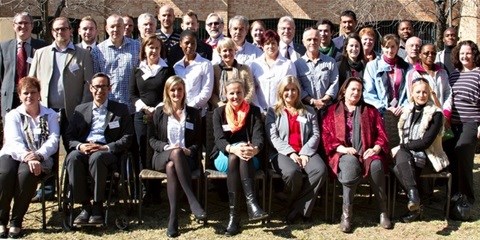These workshops bring together some of the top global IT industry experts and leading academics to develop and conduct intense training courses in ICT-related research fields. The aim is to encourage knowledge transfer and partnerships between countries as well as business and tertiary institutions.

"The key to resolving most of the socio-economic problems facing Africa lies in the hands of education. With a sufficiently educated population, the opportunities for this continent are limitless," says SYSPRO Marketing Director, Meryl Malcomess.
The theme of the first day of the workshop was The IT Industry's Demands for the Future, whilst the second day addressed IT Educational Insight and Need for Growth.
"We are well aware that the challenges facing education and the resultant skills shortage in Africa will not be resolved overnight," says Malcomess. "But technology is integral to enabling the solutions and at SYSPRO we believe it is the responsibility of corporations to step up and play a role in shaping our continent's future."
SYSPRO already has a well-developed partnership with the Nelson Mandela Metropolitan University (NMMU). "Knowing that IT is a crucial enabler of education, we are specifically involved in projects that harness social media, mobile technology and ERP to deliver training across Africa at a fraction of the usual cost," says Malcomess.
The DASIK project is funded by the German Academic Exchange Service (DAAD) and the Federal Ministry for Economic Cooperation and Development (BMZ). It is a joint venture between the department of Computing Sciences at NMMU, the University of Oldenburg in Germany and several private sector industry partners.
The first phase of the project saw the definition of a concrete catalogue of practice-oriented topics related to specific ICT fields. These include Business Process Modelling (BPM), Enterprise Resource Planning (ERP), Business Intelligence (BI), Mobile Computing and Environmental Management Information Systems.
In the second phase, courses and workshops were presented to selected members of each partner institution (students from the academic institutions, as well as employees from the industry partners).
"Industry partners can increase the skills base of their employees and gain new knowledge in the chosen ICT fields at a fraction of the usual cost. They also get the opportunity to strengthen the partnerships with higher education institutes in order to satisfy their future employee and market demands," explains Malcomess.
"Technology provides unbounded opportunities for education," says Malcomess. "It is particularly heartening to see grass-roots projects being developed by students themselves to solve some of the challenges faced by our educational system."
IQMates is one such startup that is taking advantage of these opportunities. Speaking on the second day of the DASIK workshop, applied mathematics student and founder of IQMates, Houston Muzamhindo, described the startup's goal of creating a national system of shared learning in South Africa.
"We want to solve the problem of the high university dropout rate - especially at first year level," says Muzamhindo. "The national first year dropout rate is currently a staggering 40%. This is due to a number of factors, including financial constraints, a lack of resources and the fact that learners are not properly prepared for university at school level."
According to Muzamhindo, IQMates aims to provide much-needed support for students outside of lectures by means of tutorial videos, open forums and cloud-based course materials.
"While many students have resorted to creating their own Facebook groups to discuss their courses, this is not the ideal context for learning to take place," says Muzamhindo. "Other online learning tools exist, but they are too fragmented and lack the kind of open access model we have created IQMates on."
The start-up's mission is to connect students from all over the world, allowing them to share knowledge, while also connecting students with tutors and instructors to foster academic collaborations. After going live in 2013, IQMates currently offers resources for 21 courses with more than 1 000 videos, over 3 800 registered users and a sign-up rate of 200 new users per month.
"The challenge going forward is sourcing relevant content and gaining support from academics and corporates alike," explains Muzamhindo. "We also want to make our platform accessible on mobile and expand the scope of resources available to support high school learners. The time is now to start improving our education system - we can't sit back and wait for others to do what we can do ourselves."
"By bringing entrepreneurs like Houston into a forum such as DASIK, we hope to open doors to future partnerships that will see projects such as IQMates flourish and truly make an impact," says Malcomess. "Future generations of South Africans must be equipped with the right ICT knowledge and career guidance."
Malcomess was recently awarded the Industry Ambassador Award by NMMU's Department of Computing Sciences for her commitment to supporting the educational development of the IT industry's future leaders. She has spearheaded the partnership between SYSPRO and the university to encourage the use of new technologies in innovative ways to meet the growing demand for IT skills in South Africa.